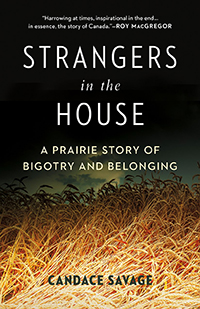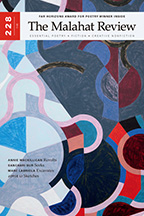Reviews
Nonfiction Review by Rowan McCandless
Candace Savage, Strangers in the House: A Prairie Story of Bigotry and Belonging (Vancouver: Greystone, 2020). Cloth, 248 pp., $32.95.
 During the fall of 2019, I had the pleasure of attending a reading given by Candace Savage at the Gabrielle Roy House in Saint Boniface, Manitoba. As she read from Strangers in the House, I felt a deep connection to her work, and to the echoes of the past that a house might hold. Savage lives in Saskatoon, in a house built in 1928. In Strangers, she explores the history of the Blondins, a French Canadian family who were the original owners of the house that the author has called home for almost thirty years. A slip of paper with the names of past owners, researched by her daughter, Diana, for a school project, piques Savage’s interest. A kitchen renovation leads to further curiosity as the residue between the walls reveals its treasures: the lid to a cardboard box that would have held plasticine with a child’s scribble “Ralph Blondin”; torn frosting pages from a recipe book; a man’s button-up dress collar; the grimy cover of a children’s cowboy book; a child’s math homework; a photographic negative of people at the beach.
During the fall of 2019, I had the pleasure of attending a reading given by Candace Savage at the Gabrielle Roy House in Saint Boniface, Manitoba. As she read from Strangers in the House, I felt a deep connection to her work, and to the echoes of the past that a house might hold. Savage lives in Saskatoon, in a house built in 1928. In Strangers, she explores the history of the Blondins, a French Canadian family who were the original owners of the house that the author has called home for almost thirty years. A slip of paper with the names of past owners, researched by her daughter, Diana, for a school project, piques Savage’s interest. A kitchen renovation leads to further curiosity as the residue between the walls reveals its treasures: the lid to a cardboard box that would have held plasticine with a child’s scribble “Ralph Blondin”; torn frosting pages from a recipe book; a man’s button-up dress collar; the grimy cover of a children’s cowboy book; a child’s math homework; a photographic negative of people at the beach.
Who were these people, Savage wondered? What was life like for the Blondin family as they set down roots in a neighbourhood enclave that was historically established for white, Anglo-Saxon Protestants only? What happened in the lives of Napoléon Sureau dit Blondin, and his wife, Clarissa Marie “Clara” Parent, so that the home that they had built during the late 1920s was lost to them by 1932? And what would have caused Clara to have anglicized her name and to refuse to have her native language spoken in her home?
In her book, Savage asks her partner, “do you think that the big events in history sometimes echo down through people’s lives for generations afterwards?” Her interest in the Blondins and the cultural and political times they lived in lead her to comb through public records and historical documents. She even has the opportunity to speak to a number of Napoléon and Clara Blondin’s descendants. Savage recounts the prejudice and the hardships faced by the Blondins as she traces Napoléon’s ancestry. We follow his grandfather, who was born in 1821 and was likewise proudly named Napoléon Sureau dit Blondin, as well as Napoléon’s father, Cléophas, who was born in 1844.
In Strangers, we also come face to face with the Orange Order and the Ku Klux Klan, racist organizations set on ensuring that the Prairies became and remained white—meaning white, Anglo-Saxon Protestant. The difficulties faced by a francophone family as they try to homestead on the Prairies against the historical background of “British exceptionalism” and Empire prove daunting. As a Black, biracial woman, with deep roots in Nova Scotia, and Polish ancestors who homesteaded in Cook’s Creek, Manitoba, I was familiar with the prejudice and racism experienced historically by my family from these organizations. What I was not aware of was that French Canadian families like the Blondins in Saskatchewan were considered and treated as “undesirables” as well.
One may ask whether it is Savage’s place to write this story, a consideration that she addresses in her book: “And yet, I do have a place in these traumas, that left a mark on an entire continent, including the nation I call home. They are among our foundational stories and belong to us all.” Further to this point, she writes that “We live in a house of stories bequeathed to us by the past. It’s no mansion filled with wonders; in fact, it is a fixer-upper, in need of loving care. When we find cracks in the foundations and rot in the woodwork, then it’s good to face up to the defects and bring them out into the light. And it’s good, so good, to sit with one another and share our experiences. Stories are living things. They transcend boundaries and divisions;
they seek out common ground. There is room in our house of stories for everyone.”
Candace Savage is the award-winning author of more than twenty-four books, including A Geography of Blood, which won the Hilary Weston Writers’ Trust Prize for Nonfiction. She is also winner of the 2004 Saskatchewan Book of the Year Award for Prairie: A Natural History, and a Fellow of the Royal Society of Canada and the Royal Canadian Geographical Society. The story of the Blondins and the political and cultural forces that discouraged their journey and their arrival on the Prairies is masterfully crafted under Savage’s talented writing chops. This latest book will attract readers who are interested in Métis and French history on the Prairies, a family’s story of hardship and resiliency, and the presence and influence of white Anglo supremacy in Canada. The Blondin’s story is an essential piece of Canadian history that needs to be told.
—Rowan McCandless









